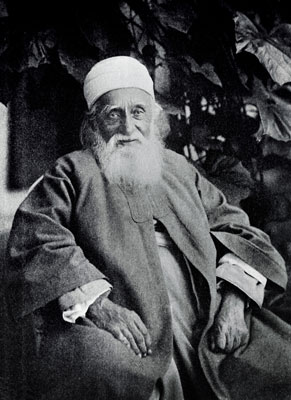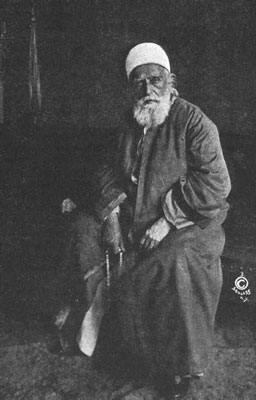Environment and Spirituality 3
Social transformation - the role of spirituality
Course prepared by Arthur Dahl
Why are you afraid?
Justice is, in this day, bewailing its plight, and Equity groaneth beneath the yoke of oppression. The thick clouds of tyranny have darkened the face of the earth, and enveloped its peoples. Through the movement of Our Pen of glory We have, at the bidding of the omnipotent Ordainer, breathed a new life into every human frame, and instilled into every word a fresh potency. All created things proclaim the evidences of this worldwide regeneration. This is the most great, the most joyful tidings imparted by the Pen of this wronged One to mankind. Wherefore fear ye, O My well-beloved ones? ?
Bahá'u'lláh, Gleanings from the Writings of Bahá'u'lláh, section XLIII, 2nd paragraph
The need for religion
In truth, religion is a radiant light and an impregnable stronghold for the protection and welfare of the peoples of the world, for the fear of God impelleth man to hold fast to that which is good, and shun all evil. Should the lamp of religion be obscured, chaos and confusion will ensue, and the lights of fairness and justice, of tranquility and peace cease to shine.
Baha'u'llah, Tablets of Baha'u'llah, 8. Ishráqát (Splendors), The first Ishráq
Religion

The disease which afflicts the body politic is lack of love and absence of altruism. The spiritual teachings of the religion of God can alone create this love, unity and accord in human hearts.
'Abdu'l-Bahá, The Promulgation of Universal Peace, p. 171, 61.
The role of religion
Through its teachings and through the examples of human lives illumined by these teachings, masses of people in all ages and lands have developed the capacity to love. They have learned to discipline the animal side of their natures, to make great sacrifices for the common good, to practise forgiveness, generosity, and trust, to use wealth and other resources in ways that serve the advancement of civilization. Institutional systems have been devised to translate these moral advances into the norms of social life on a vast scale. However obscured by dogmatic accretions and diverted by sectarian conflict, the spiritual impulses set in motion by such transcendent figures as Krishna, Moses, Buddha, Zoroaster, Jesus, and Muhammad have been the chief influence in the civilizing of human character.
The Prosperity of Humankind, Bahá’í International Community, IV
A change of heart
We need a change of heart, a reframing of all our conceptions and a new orientation of our activities. The inward life of man as well as his outward environment have to be reshaped if human salvation is to be secured.
Secretary of Shoghi Effendi, letter of 27 May 1932 to an individual believer, published in "Conservation of the Earth's Resources" prepared by the Research Department of the Universal House of Justice, 3.3
Civilizatiom

Material civilization is like the body. No matter how infinitely graceful, elegant and beautiful it may be, it is dead. Divine civilization is like the spirit, and the body gets its life from the spirit, otherwise it becomes a corpse.
('Abdu'l-Bahá, Selections from the Writings of 'Abdu'l-Bahá, 227, pp. 303-304)
...without this light the world of mankind is in utter darkness. For the world of nature is an animal world. Until man is born again from the world of nature, that is to say, becomes detached from the world of nature, he is essentially an animal, and it is the teachings of God which convert this animal into a human soul.
('Abdu'l-Bahá, Selections from the Writings of 'Abdu'l-Bahá, 227, pp. 303-304)

...although... material achievements and the development of the physical world produce prosperity, ...dangers, severe calamities and violent afflictions are imminent.
Progress and barbarism go hand in hand, unless material civilization be confirmed by Divine Guidance... and be reinforced by spiritual conduct.
('Abdu'l-Bahá, Selections from the Writings of 'Abdu'l-Bahá, 225, p. 282)
Justice

And among the teachings of Bahá'u'lláh are justice and right. Until these are realized on the plane of existence, all things shall be in disorder and remain imperfect. The world of mankind is a world of oppression and cruelty, and a realm of aggression and error.
('Abdu'l-Bahá, Selections from the Writings of 'Abdu'l-Bahá, 227, p. 304)

We ask God to endow human souls with justice so that they may be fair, and may strive to provide for the comfort of all, that each member of humanity may pass his life in the utmost comfort and welfare. Then this material world will become the very paradise of the Kingdom, this elemental earth will be in a heavenly state and all the servants of God will live in the utmost joy, happiness and gladness. We must all strive and concentrate all our thoughts in order that such happiness may accrue to the world of humanity.
'Abdu'l-Bahá, The Promulgation of Universal Peace, 3 September 1912, Abdu'l-Baha’s Address to Socialists and Labor Leaders in Coronation hall, Montreal, Canada, (7th to the last paragraph)
Radical rethinking
The enterprise requires a radical rethinking of most of the concepts and assumptions currently governing social and economic life. It must be wedded, as well, to a conviction that, however long the process and whatever setbacks may be encountered, the governance of human affairs can be conducted along lines that serve humanity’s real needs.
(Bahá’í International Community, 1995. The prosperity of humankind, VII para. 1)
Spiritual principle
The essential merit of spiritual principle is that it not only presents a perspective which harmonizes with that which is immanent in human nature, it also induces an attitude, a dynamic, a will, an aspiration, which facilitate the discovery and implementation of practical measures. Leaders of governments and all in authority would be well served in their efforts to solve problems if they would first seek to identify the principles involved and then be guided by them.
(Universal House of Justice, The Promise of World Peace, 1985. p.13)
An organic change
The principle of the Oneness of Mankind… is no mere outburst of ignorant emotionalism or an expression of vague and pious hope…. It implies an organic change in the structure of present-day society, a change such as the world has not yet experienced.... It calls for no less than the reconstruction and the demilitarization of the whole civilized world—a world organically unified in all the essential aspects of its life, its political machinery, its spiritual aspiration, its trade and finance, its script and language, and yet infinite in the diversity of the national characteristics of its federated units.
(Shoghi Effendi, The World Order of Baha'u'llah, p.42, section The Principle of Oneness, 1st paragraph)
It represents the consummation of human evolution—an evolution that has had its earliest beginnings in the birth of family life, its subsequent development in the achievement of tribal solidarity, leading in turn to the constitution of the city-state, and expanding later into the institution of independent and sovereign nations.
(Shoghi Effendi, The World Order of Baha'u'llah, p.42, section The Principle of Oneness, 2nd paragraph)
Sustainable Development Goals
The United Nations has agreed on Agenda 2030 and the Sustainable Development Goals, a plan to transform society and the economy in a spirit of justice leaving no one behind.
![]()
Eliminating poverty
Although the body politic is one family yet because of lack of harmonious relations some members are comfortable and some in direst misery, some members are satisfied and some are hungry, some members are clothed in most costly garments and some families are in need of food and shelter. Why? Because this family lacks the necessary reciprocity and symmetry. This household is not well arranged. This household is not living under a perfect law. All the laws which are legislated do not ensure happiness. They do not provide comfort. Therefore a law must be given to this family by means of which all the members of this family will enjoy equal well-being and happiness.
(‘Abdu’l-Baha, Foundations of World Unity, p. 27)
Each one of you must have great consideration for the poor and render them assistance. Organize in an effort to help them and prevent increase of poverty. The greatest means for prevention is that whereby the laws of the community will be so framed and enacted that it will not be possible for a few to be millionaires and many destitute.
(‘Abdu’l-Baha, Foundations of World Unity, p. 25)
Climate Change
One of the most pressing problems of humanity in the current century is how a growing, rapidly developing, and not yet united global population can, in a just manner, live in harmony with the planet and its finite resources. Certain biological realities present themselves when an organism negatively affects or exceeds the capacity of its ecosystem. The limited availability and inequitable distribution of resources profoundly impact social relations within and between nations in many ways, even to the point of precipitating upheaval and war. And particular arrangements of human affairs can have devastating consequences for the environment.
(Universal House of Justice, letter of 29 November 2017 https://www.bahai.org/library/authoritative-texts/the-universal-house-o…
The question of the impact of climate change, and to what extent it is man-made and its effects can be ameliorated, is today a major aspect of this larger problem. The Revelation of Bahá’u’lláh directly and indirectly touches on a range of such concerns in a manner that speaks to a harmony between society and the natural world. It is essential, therefore, that Bahá’ís contribute to thought and action regarding such matters.
(Universal House of Justice, letter of 29 November 2017 https://www.bahai.org/library/authoritative-texts/the-universal-house-o…
Applying justice and equity to Climate Change
In the face of the destructive impacts of climate change – exacerbated by the extremes of wealth and poverty – a need for new approaches centered on the principles of justice and equity is apparent.
...view the climate change challenge through a new lens – one that perceives humanity as a unified whole, not unlike the cells of the human body, infinitely differentiated in form and function yet united in a common purpose which exceeds that of its component parts.
(Bahá'í International Community, 2008)
Sustainability – our responsibility
As trustees or stewards of the planet's resources and biodiversity, we must:
- ensure sustainability and equity of resource use into distant future
- consider the environmental consequences of development activities
- temper our actions with moderation and humility
- value nature in more than economic terms
- understand the natural world and its role in humanity's collective development both material and spiritual
(based on Bahá'í International Community, Valuing Spirituality in Development. 1998)
Sustainability - fundamental responsibility
Sustainable environmental management must come to be seen not as a discretionary commitment mankind can weigh against other competing interests, but rather as a fundamental responsibility that must be shouldered, a pre-requisite for spiritual development as well as the individual's physical survival.
(based on Bahá'í International Community, Valuing Spirituality in Development. 1998)
The pandemic shows the need for unity
Seldom has it been more evident that society’s collective strength is dependent on the unity it can manifest in action, from the international stage to the grassroots...
Universal House of Justice, Naw-Ruz 177 (20 March 2020)
Pathway to Sustainability
The pathway to sustainability will be one of empowerment, collaboration and continual processes of questioning, learning and action in all regions of the world. It will be shaped by the experiences of women, men, children, the rich, the poor, the governors and the governed as each one is enabled to play their rightful role in the construction of a new society. As the sweeping tides of consumerism, unfettered consumption, extreme poverty and marginalization recede, they will reveal the human capacities for justice, reciprocity and happiness.
(Bahá'í International Community, Rethinking Prosperity: Forging Alternatives to a Culture of Consumerism, 2010)
Questions for discussion
How do you respond to the proposal to apply the concept of justice to environmental problems like climate change?
How can we apply the spiritual teachings of compassion and empathy to resolve poverty?
How might you imagine a global institution that could efficiently reduce climate change?
If the only solution to the world’s problems is religion, how can we communicate this in our secular and materialistic society?

Last updated 9 January 2021
